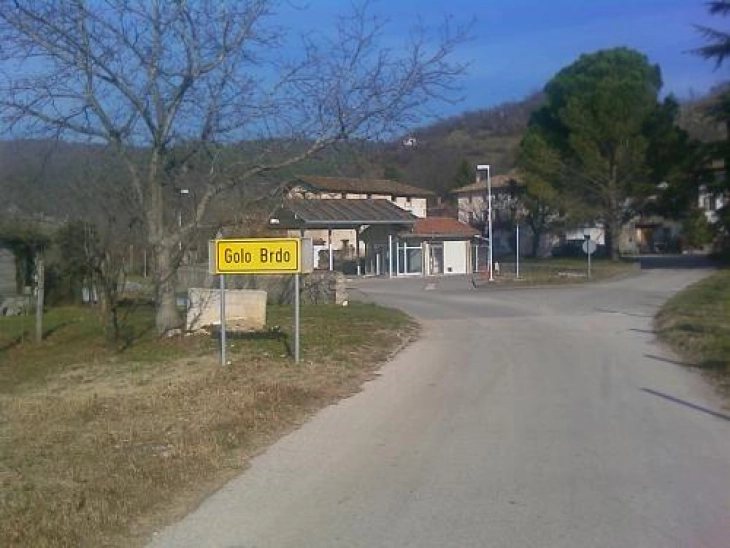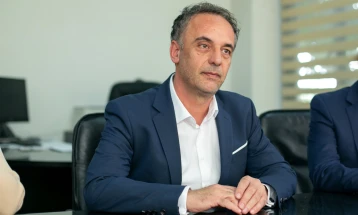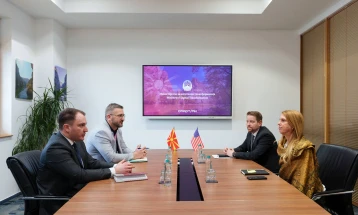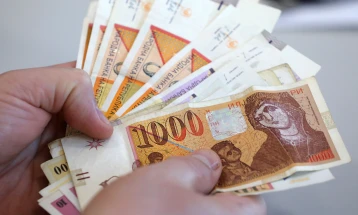Macedonian community in Albania is not related to Bulgaria in terms of language, tradition and customs, say the Macedonians from Prespa, Golo Brdo, Gora

Tirana, 25 August 2022 (MIA) – “There are Macedonians in Albania, there are no, and never have been Bulgarians. Bulgaria is trying to fabricate a nonexistent minority. According to all censuses carried out in Albania from the creation of the Albanian state until the last census, there is not a single person, not a single individual registered as Bulgarian in the country’s registries, we speak, we sing, we grieve in Macedonian, and this fact cannot be disputed by anyone. We have endured many pressures and threats for centuries, but no one will destroy our Macedonian gene.” This is a short overview of what one might hear from the Macedonians living in the areas of Prespa, Golo Brdo, Gora, where they are the most numerous, but also in Tirana, Durrës, Elbasan, Korce, where there are a few tens of thousands of them.
“In the area of Prespa, in 2011, when the census was carried out in the village of Vrbnik in the Devoll region, 100 percent of the population declared themselves as Macedonian. There is not a single Bulgarian. The Bulgarian community in Albania is a project of Greater Bulgaria. The issue is more related to Macedonia. Bulgaria does not recognize the Macedonian nation. Wherever there are Macedonians, Bulgaria claims they are Bulgarians and spreads its propaganda in the areas with Macedonian minorities, in Gora, Golo Brdo, Pustec, Vrbnik,” the leader of the only Macedonian party in Albania, the Macedonian Alliance for European Integration, Vasil Sterjovski, tells MIA.
The President of the Macedonian association “Ilinden” – Tirana, Nikolaj Gjurgjaj is of the same opinion and says there are no Bulgarians in Albania, only Macedonians.
“I, as well as tens of thousands of others, among which university professors Vita Koja, Kimet Fetahu, Tirana Deputy Mayor Mazniku, the Nikola family, whose daughter-in-law Lindita, is the president of the Parliament and many others, come from Golo Brdo and always proudly say that we are Macedonians. This is also the case with the Macedonians in Gora. One of the greatest fighters for the rights of Macedonians, Nazif Dokle, spoke the truth until his last breath that there are only Macedonians in Gora. How many Bulgarians are there in Albania? The latest parliamentary elections in Bulgaria answered this, the only registered voters in the Embassy in Tirana were the staff,” said Gjurgjaj.
With a sense of bitterness and disappointment he assesses that “it is shameful that a Bulgarian minority was included in Albania’s law on protection of minorities under pressure from Sofia”.
Both the common citizens Macedonians and their representatives organized in the single party, the Macedonian Alliance for European Integration, the “Ilinden”, “Sonce”, “Mir” associations… acknowledge that in the last few years they have been facing an aggressive Bulgarian policy for their assimilation, and they are disappointed that Albania, under the threat of a Bulgarian veto on the EU accession talks, relented and added a Bulgarian minority to the law on protection of minorities.
“The Macedonians in Albania in the last few years have been facing an aggressive Bulgarian assimilation policy. Albania has been silent when it comes to this policy, but it has also aided it many times, in order to avoid having its EU accession talks blocked by Bulgaria,” says Sterjovski.
He adds that this was the case with the recognition of the nonexistent Bulgarian minority in 2017.
“By using its EU membership, Bulgaria was able to pressure Albania into recognizing the nonexistent Bulgarian minority in 2017, when not a single criterion for the recognition of such minority existed, because no census in Albania ever registered a single Bulgarian. Additionally, in none of the reports drafted up by Albania for the international organizations which track minority rights, is it said that there is a Bulgarian minority in Albania. It is only because of the Bulgarian pressure in 2017 and the threat of veto, that the nonexistent Bulgarian minority was recognized,” he says.
Sterjovski points out that during the discussion of the draft legislation on the protection of minorities, which was attended by a representative of the Bulgarian Embassy and of the ‘fictitious Bulgarians in Albania’, he protested, and was supported by the then Minister for Europe and Foreign Affairs, Ditmir Bushati, who said that “hundreds of thousands of Albanians in Italy and Greece have Italian or Greek passports as well, but they are neither Italians nor Greeks”.
According to him, Bulgaria sees the entire Macedonian community, in the Balkans, as Bulgarian, and this is connected to Sofia’s policy towards Skopje.
“It is not that they are unaware of the fact there are no Bulgarians in Albania. All of this is connected to the policy and attitude of Bulgaria towards Macedonia but also towards all the Macedonian minorities in the other Balkan countries, which Bulgaria claims are Bulgarian,” says Sterjovski.
If you take a closer look, he says, you would see that the Macedonian community in Albania is in no way related to Bulgaria in terms of language, tradition, customs or songs.
“The community is compact and on the border with Macedonia, not at the border with Sofia. If you take a look at the folklore, the songs, for example, there are a lot of songs from the Ottoman period singing about the liberation of Macedonia, there is not a single song for Bulgaria. There is not a single connection to Bulgaria,” says Sterjovski.
Regarding the Bulgarian passports, he says that it is a very profitable business and that the ethnic Albanians receive Bulgarian passports as well, besides the Macedonians.
“A single Bulgarian passport now costs around 15-20 thousand euro. There are Albanians, Albanians not Macedonian, who pay 15-20 thousand euro. Which is why I say as a business this is more profitable than growing marijuana,” says Sterjovski.
He says that there are no figures on the total number of Bulgarian passports handed out in Albania in the last few years, but “the majority of them have been obtained by Albanians, not Macedonians”.
“The Bulgarian passport is currently a ticket allowing one to escape to the EU and as an EU citizen use all the privileges of the European Union. In the last few years, anyone who obtained a passport has moved to a Western country,” he says.
The citizens of Golo Brdo confirm this.
“Our region, together with the Gora region, are the poorest ones in Albania. In the 21st century we lack adequate roads, plumbing, and job opportunities. The burden of poverty forces the population to obtain a Bulgarian passport and secure their existence in one of the Western European countries. It is a result of having no alternatives, they are forced to do it, but when it comes to the national feeling no one can remove that from our hearts. We have been, are and will remain Macedonians,” says Ili Halilaj from the village of Trebishte.
Sterjovski, who was the first MP in the Albanian Parliament who publicly declared himself as Macedonian, says that the Macedonian minority feels threatened by Bulgaria’s actions which are “meddling with the internal affairs of Albania, while Albania does not react”.
“The Macedonian minority feels threatened. Unfortunately, there is no response from Albania regarding the Bulgarian propaganda in areas populated with Macedonians. For us, the actions of Bulgaria, which is trying to assimilate the Macedonian population in Albania with 19th century methods, represent meddling in the internal affairs of Albania. As an MP in the Albanian Parliament, I have stated this concern on numerous occasions, especially regarding the work of the Bulgarian Embassy and all its activities for the assimilation of the Macedonian minority. I sought reaction from the Albanian institutions, but unfortunately, Albania prioritized opening EU negotiations and avoiding issues with Bulgaria thus allowing the Bulgarian propaganda to spread freely,” Sterjovski points out.
The Albanian authorities recognize minority status in the Pustec and Vrbnik Municipalities, but if the Macedonian inhabitants leave the area and move to another part of the country they are automatically registered as Albanians. The Macedonian minority in Golo Brdo has been recognized since the 1950s, when there was education in Macedonian as well.
According to the representatives of the Macedonian associations there are over 120.000 ethnic Macedonians in the country.
In the meantime, the Macedonian community is also trying to receive a positive response to their request for the establishment of two new Macedonian minority municipalities in the Gora area in Kukes and in the Golo Brdo area in the Peshkopi (Diber) county, a demand they have had since 2014, as well as the renaming of Pustec into the Municipality of Prespa.
“We welcome the establishment of the special parliamentary committee on new territorial reform and we hope that our requests will be accepted. After the territorial reorganization in Albania in 2014, the Government abolished the municipalities of Trebishte, Ostreni and Steblevo in Golo Brdo, adding the first two to the Bulqize Municipality, and the third one to Librazhd, as well as the municipalities of Shishtavec, Topojan and Zapod, in the Gora area, which are now a part of the Municipality of Kukes. The Macedonians in both areas are now the least represented, because they don’t have a single councilor in Bulqize or Kukes, and very few are employed in the local administrations. There are basically no investments so the issues with lack of plumbing, sewage, roads, electricity still exist,” the vice president of the Macedonian association “Most”, Edmond Osmani, tells MIA.
He says that maybe the case of the population of Trebishte, is the only such case in the world, where because of lack of adequate roads, the inhabitants have to cross two border crossings with North Macedonia, in order to get to Bulqize.
“It’s the same with the inhabitants of Borje and Shishtevac, who have to cross two border crossings with Kosovo in order to reach Kukes,” says Osmani
He adds that together with Sterjovski, in the name of the Macedonians in Mala Prespa, they asked that the Municipality of Pustec, the only Macedonian municipality, according to the current territorial organization, be renamed into Prespa, because Pustec is only one of the nine villages while at the same time 90 percent of the territory of the National Park “Prespa” is a part of this area.
This request is supported by the “Ilinden” association as well.
“We support the request with the hopes that we will receive a positive answer. At the same time, I should mention that because of the bad road infrastructure the inhabitants of Golo Brdo and Gora, have to travel for hours to reach the municipal centers, while during the winter periods, due to heavy snowfall, they remain snowed in for weeks and without electricity,” says Gjurgjay.
The Macedonians in Albania face many problems in the 21st century. They are waiting for an answer to a request submitted three decades ago, for the recognition of the minority status on the entire territory of the country, but they emphasize their unity as their special characteristic, which has never come into question.
“The Macedonians in Albania never divided each other based on religious affiliation, whether they are Orthodox or Muslim, we are simply all Macedonians, and we say it with pride. We have been together throughout history, and we are together now as well – as Macedonians, anyone can seek to turn us into a minority of their own if they want to, it will all be in vain,” conclude the Macedonians from Albania.
Vera Todorovska
Translated by Angel Dimoski







